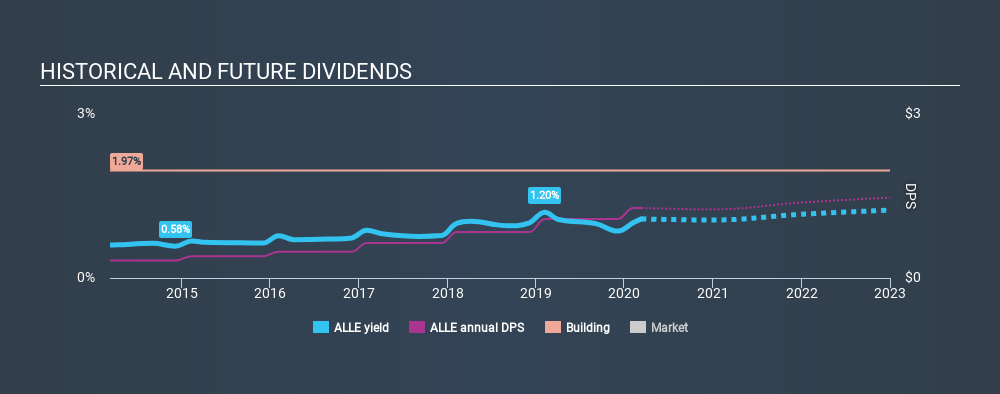Stock Analysis

Regular readers will know that we love our dividends at Simply Wall St, which is why it's exciting to see Allegion plc (NYSE:ALLE) is about to trade ex-dividend in the next 4 days. Investors can purchase shares before the 16th of March in order to be eligible for this dividend, which will be paid on the 31st of March.
Allegion's next dividend payment will be US$0.32 per share, on the back of last year when the company paid a total of US$1.08 to shareholders. Calculating the last year's worth of payments shows that Allegion has a trailing yield of 1.1% on the current share price of $118.39. If you buy this business for its dividend, you should have an idea of whether Allegion's dividend is reliable and sustainable. So we need to investigate whether Allegion can afford its dividend, and if the dividend could grow.
Check out our latest analysis for Allegion
If a company pays out more in dividends than it earned, then the dividend might become unsustainable - hardly an ideal situation. Allegion paid out a comfortable 25% of its profit last year. Yet cash flows are even more important than profits for assessing a dividend, so we need to see if the company generated enough cash to pay its distribution. The good news is it paid out just 24% of its free cash flow in the last year.
It's positive to see that Allegion's dividend is covered by both profits and cash flow, since this is generally a sign that the dividend is sustainable, and a lower payout ratio usually suggests a greater margin of safety before the dividend gets cut.
Click here to see the company's payout ratio, plus analyst estimates of its future dividends.

Have Earnings And Dividends Been Growing?
Companies with consistently growing earnings per share generally make the best dividend stocks, as they usually find it easier to grow dividends per share. If earnings decline and the company is forced to cut its dividend, investors could watch the value of their investment go up in smoke. For this reason, we're glad to see Allegion's earnings per share have risen 17% per annum over the last five years. The company has managed to grow earnings at a rapid rate, while reinvesting most of the profits within the business. Fast-growing businesses that are reinvesting heavily are enticing from a dividend perspective, especially since they can often increase the payout ratio later.
The main way most investors will assess a company's dividend prospects is by checking the historical rate of dividend growth. Allegion has delivered 26% dividend growth per year on average over the past six years. It's great to see earnings per share growing rapidly over several years, and dividends per share growing right along with it.
Final Takeaway
Is Allegion worth buying for its dividend? Allegion has been growing earnings at a rapid rate, and has a conservatively low payout ratio, implying that it is reinvesting heavily in its business; a sterling combination. It's a promising combination that should mark this company worthy of closer attention.
With that in mind, a critical part of thorough stock research is being aware of any risks that stock currently faces. For example - Allegion has 1 warning sign we think you should be aware of.
We wouldn't recommend just buying the first dividend stock you see, though. Here's a list of interesting dividend stocks with a greater than 2% yield and an upcoming dividend.
If you spot an error that warrants correction, please contact the editor at editorial-team@simplywallst.com. This article by Simply Wall St is general in nature. It does not constitute a recommendation to buy or sell any stock, and does not take account of your objectives, or your financial situation. Simply Wall St has no position in the stocks mentioned.
We aim to bring you long-term focused research analysis driven by fundamental data. Note that our analysis may not factor in the latest price-sensitive company announcements or qualitative material. Thank you for reading.
About NYSE:ALLE
Allegion
Manufactures and sells mechanical and electronic security products and solutions worldwide.
Established dividend payer with proven track record.

